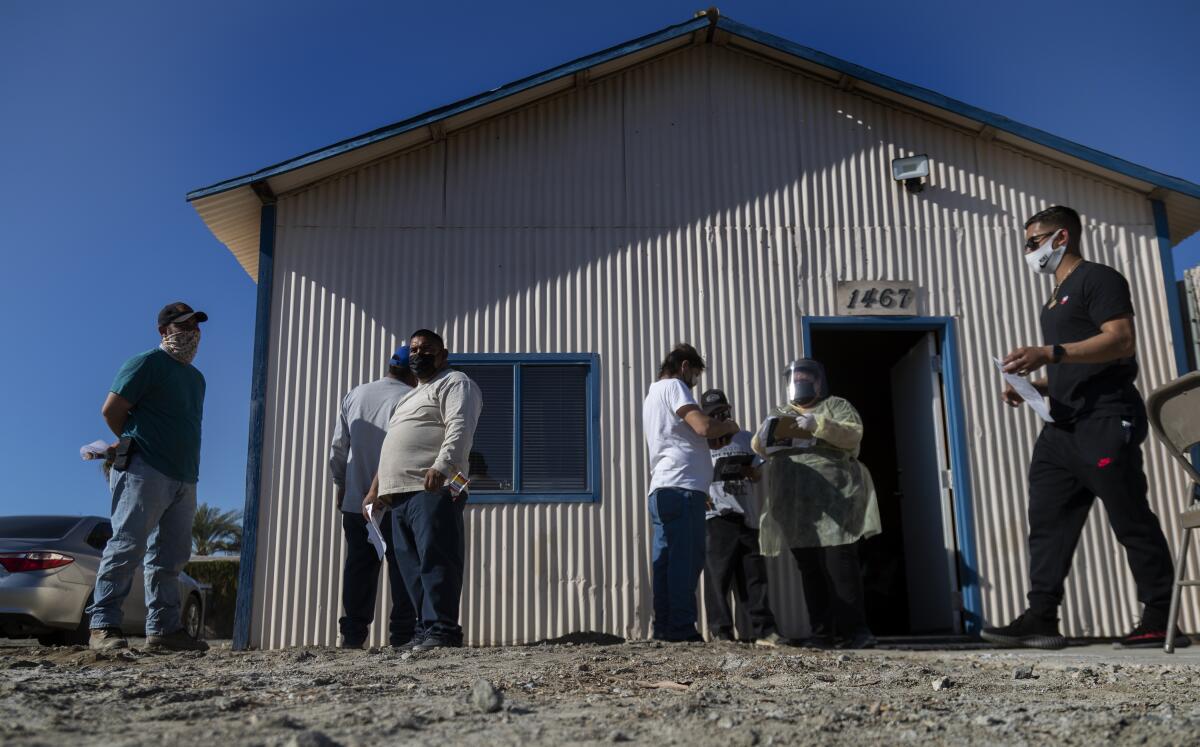Californians broadly back COVID-19 hazard pay, protections for farmworkers, poll finds

Californians overwhelmingly support legislation that provides enhanced farmworker protections and gives hazard pay to essential workers, according to a poll released by the UC Berkeley Institute of Governmental Studies.
Hazard pay has become a hot issue in progressive cities throughout the state, with backers saying grocery workers have put their health at risk to serve customers as COVID-19 spreads. The California Grocers Assn., which says such measures are too costly for business owners to absorb, has challenged ordinances in court.
The Berkeley IGS poll released Tuesday found broad support for these measures, with 77% of all respondents saying they back legislation that gives hazard pay to front-line essential workers until they are able to receive vaccines. More than 70% of Black and Latino respondents strongly support these measures. Sixty-five percent of Native American, 58% of Asian Americans and Pacific Islanders and 47% of white respondents strongly supported the measures. The poll found just 17% of all respondents opposed it.
The poll also found broad support for farmworker protections, including providing paid sick leave and medical benefits.
Eighty-seven percent of all respondents agreed employers should provide farmworkers with access to handwashing stations, personal protective equipment and working conditions that allow social distancing. Support was especially high among Latino respondents, with 92% agreeing.
Fewer than 70% of all respondents said undocumented farmworkers in the U.S. illegally should receive the same medical and paid sick leave benefits as documented farmworkers if they fall sick with COVID-19. But support was noticeably higher among Latino respondents with 83% agreeing. Just 61% of white and Native American respondents agreed.
The study was conducted online between Jan. 23-29 among more than 10,000 registered state voters.
The poll found Californians of color, especially Latino and Native Americans, were most likely to say they or their families were negatively impacted by the pandemic.
Half of the Latino respondents said not being able to pay for basic necessities was a very serious problem. Less than 40% of Black and Native American and 24% of Asian American and Pacific Islander respondents said the same. Just 15% of white respondents agreed.
More than 60% of Latino and Native American respondents said not being able to get medical care was a serious problem. Just 34% of white respondents said the same.
âThe patterns continue to show that the coronavirus presents one of the greatest racial justice challenges of our time,â IGS Co-Director G. Cristina Mora said in a statement supporting the study. Mora did not respond to a request for an interview.
âCOVID-19 has exacerbated long-standing inequalities within the state. Communities of color are suffering disproportionately, both economically and socially, and the amount of fear and reported loss, especially among Latinos, is undeniable,â Mora said.
The United States this week surpassed 500,000 COVID-19 deaths â a number greater than the combined U.S. battlefield deaths in both world wars and Vietnam. In California, nearly 50,000 have died, according to The Timesâ tracker.
Black and Latino Californians have contracted the virus at a higher rate than Asian and white people. The same demographic dies more often than other races relative to the population.
More to Read
Sign up for Essential California
The most important California stories and recommendations in your inbox every morning.
You may occasionally receive promotional content from the Los Angeles Times.











